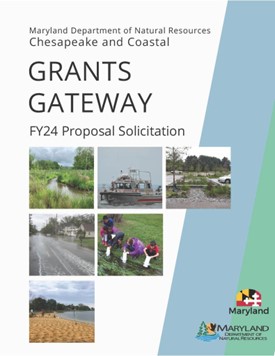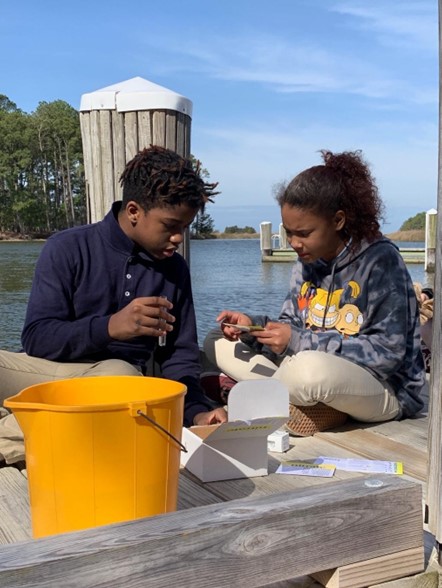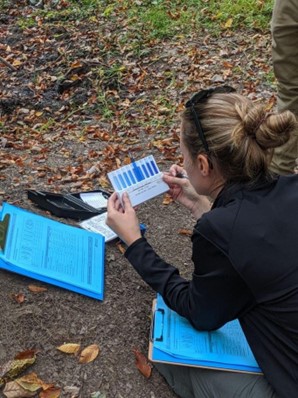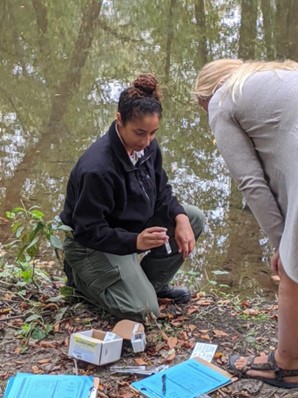Funding Available for Outdoor Learning and Watershed Stewardship!
-- This funding application cycle ends December 16, 2022 and will reopen in the fall of 2023 --

Full solicitation:https://dnr.maryland.gov/ccs/Documents/FY24_Grants-Gateway-Solicitation.pdf
To apply: https://dnr.maryland.gov/ccs/Pages/funding/grantsgateway.aspx

This funding is offered under Outcome 4 as it becomes available to support outdoor education programming that addresses environmental literacy and action needs found in student and other community populations whose local and common basic need resources, such as land and water, have been negatively and disproportionately affected by environmental changes whether naturally occurring or resulting from human impacts and which are affecting public health and Maryland’s biodiversity.
Project audiences should be identified and supported using tools such as but not limited to the
Maryland Environmental Justice Screening Tool,
Maryland Park Equity Mapper, and the
Get Kids Outside in Maryland initiative,the Chesapeake Bay Program’s
ChesapeakeProgress and the
Maryland Stream Health map, to identify, demonstrate, or support audience and focus. The project originates or works within a community, school district, or watershed affected by local environmental issues and phenomena such as, but not limited to: poor water quality due to land development, large-scale agriculture and other sources of pollution; heat island effects due to urbanization and increasing outdoor temperatures; job and economic losses due to climate instability and change, along with diminishing natural resources and industries; sea-level rise, subsidence and other land or shoreline loss affecting communities; increasingly severe aerial or sunny day flooding events; other urgent public health issues from environmental impacts that need attention, investigation, education, and action.
While considering how natural and human systems constantly affect one another, projects should explore, investigate, and activate stewardship resulting in real-world action outcomes that may include habitat restoration of public lands and spaces, creative ways of gathering and sharing data for the historical and scientific records as well as to impact various audiences, creating shareable educational resources such as outdoor classrooms and curriculum, organizing inclusive environmental and climate literacy advocacy and outreach initiatives linking students to green jobs networks, and other services and outcomes. Partners are encouraged to approach this work through
problems-based learning and hands-on, investigative science models such as the
Meaningful Watershed Educational Experience (MWEE) using a climate and environmental equity lens that looks at how the health of our natural resources and access to them impact equity and health in human communities and other living communities. Any project should use
environmental and outdoor education best practices and those that are working with K-12 schools should address where their project meets
state curriculum standards and
Next Generation Science Standards (NGSS).
Explore and Restore Maryland Programs
Join fellow teachers, students, and community members to investigate local watersheds and their ecosystems and discuss ways to take protective and restorative environmental action towards habitat preservation, restoration and improvement through hands-on education initiatives to help collectively improve awareness and stewardship of Maryland’s essential outdoor communities and ecosystems. Educators and schools are directly in line with Maryland’s environmental literacy graduation requirement and preK-12 environmental literacy standards as they experience real-world, outdoor science investigations used to inform actions to restore the health of local habitats including our forests, streams, and coastal waterways through investigating local, real-world environmental issues and then making collaborative, informed decisions about how to take action and adapt to current and future effects.
Professional Development (PD)
Maryland Department of Natural Resources educators and scientists offer free professional development resources, workshops and trainings that highlight green careers and emphasize outdoor learning as a healthy and exciting way to educate about our natural resources and ecosystems all while meeting multidisciplinary education standards and best practices, broadening community member outdoor knowledge and skills, and offering educators, students, and other learners a way to safely explore, learn, lead and teach outdoors from rigorous science labs to environmental art, natural history, and nature appreciation activities. The COVID-19 pandemic has reminded the world of its need for a healthy biosphere and environment and offers a chance to learn to or remember how to be comfortable and safe in natural outdoor environments especially while leading students or groups on public lands and waterways. Depending on current funding, possible stipends may be available for classroom teachers attending a workshop on a day that is outside of their teaching contract obligations.
Maryland Department of Natural Resources (MD-DNR) Professional Development Schedules:
Explore and Restore Professional Development Schedule:
- ** No Explore and Restore workshops or trainings are scheduled at this time, please request, or check back. **


If you are interested in scheduling or hosting a training for a group of educators, please contact
Jennifer.Wolfe1@Maryland.gov.
Sign up here to be placed on a mailing list for future workshops.